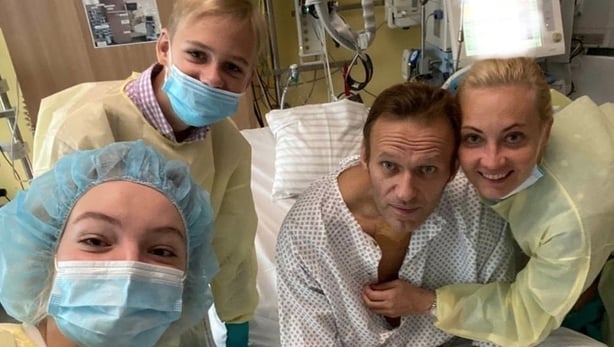The nerve agent used to poison Russian opposition leader Alexei Navalny was detected on an empty water bottle from his hotel room in the Siberian city of Tomsk, suggesting he was poisoned there and not at the airport as first thought, his team said.
Mr Navalny fell violently ill on a domestic flight in Russia last month and was subsequently airlifted to Berlin for treatment.
Laboratories in Germany, France and Sweden have established he was poisoned by a Novichok nerve agent, though Russia denies this and says it has seen no evidence.
A video posted on Mr Navalny's Instagram account showed members of his team searching the room he had just left in the Xander Hotel in Tomsk on 20 August, an hour after they learned he had fallen sick in suspicious circumstances.
"It was decided to gather up everything that could even hypothetically be useful and hand it to the doctors in Germany. The fact that the case would not be investigated in Russia was quite obvious," the post said.
It showed his team bagging several empty bottles of "Holy Spring" mineral water, among other items, while wearing protective gloves.
"Two weeks later, a German laboratory found traces of Novichok precisely on the bottle of water from the Tomsk hotel room," the post said.
"And then more laboratories that took analyses from Alexei confirmed that that was what poisoned Navalny. Now we understand: it was done before he left his hotel room to go to the airport."
Vladimir Milov, a former deputy energy minister and an ally of Mr Navalny, said his team had outplayed the FSB security police with their quick thinking: "They took the evidence from under their noses and shipped it out of the country."
Read more:
Navalny says he is 'able to breathe' unaided after suspected poisoning
EU calls for 'independent' probe into Navalny case
Mr Navalny is the most prominent political opponent of President Vladimir Putin, even though he has not been allowed to form his own party.
His investigations of official corruption, published on YouTube and Instagram, have reached audiences of many millions across Russia.
Germany, France, Britain and other nations have demanded explanations from Russia over the case, which has prompted calls for new sanctions against Moscow.
Meanwhile, a global chemical weapons watchdog has confirmed it sent experts to Germany to collect samples from Russian opposition leader Alexei Navalny and that results of tests for Novichok poisoning were "forthcoming".
Germany had formally requested its "technical assistance" over Mr Navalny's alleged poisoning, the Hague-based Organisation for the Prohibition of Chemical Weapons said.
Western governments say Mr Navalny, a well known critic of the Russian government who is being treated in a Berlin hospital, was poisoned with Novichok and has pushed Russia to shed light on the incident.
The Russian government denies all involvement.
"A team of experts from the (OPCW's) Technical Secretariat independently collected biomedical samples from Mr Navalny for analysis by OPCW designated laboratories," the OPCW said in a statement.
"Results of this analysis are forthcoming and will be shared with the German authorities."
OPCW chief Fernando Arias earlier this month voiced "grave concern" over the Navalny incident.
Germany said on Monday that labs in France and Sweden had confirmed its own finding that the banned weapons-grade substance was used, but that it was awaiting the OPCW's evaluation.
The Navalny case threatens to cause fresh tensions at the toxic arms watchdog.

Germany could ask the OPCW to use its recently-acquired mandate to attribute blame for chemical attacks - powers that Russia and its allies have bitterly opposed.
Until OPCW member states voted to give the body the new powers in 2018, it was only able to say whether chemical weapons had been used, but not by whom.
Britain drafted in the OPCW for "technical assistance" after former Russian spy Sergei Skripal and his daughter were poisoned with Novichok in the city of Salisbury in 2018, but that was before it had the new powers.

